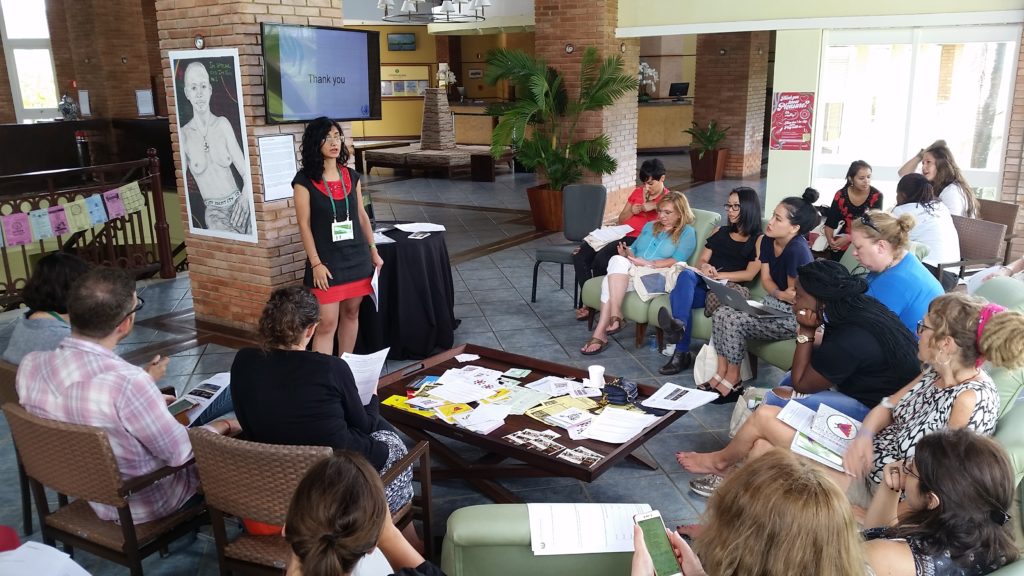WHRI: Amplifying women’s voices and supporting feminist movement building
Since 2004, the Women’s Human Rights Institute (WHRI) has been building the capacity of women’s human rights defenders to take leadership and create change locally, nationally, and internationally using a women’s human rights framework. We work to amplify women’s voices through and with UN human rights frameworks and mechanisms, in particular the UN Convention on the Elimination of All Forms of Discrimination Against Women (CEDAW) and the Special Procedures of the Human Rights Council.
The WHRI team works transnationally, and is housed within the Fundación Justicia y Género (Gender & Justice Foundation) in Costa Rica.
Why CEDAW?
Our work includes, but goes much further than, developing capacity to contribute to the CEDAW reporting process. CEDAW is not only a mechanism, but it is also a theoretical and practical framework for making change. With almost universal ratification, it represents the authoritative international legal framework for women’s human rights. At the heart of CEDAW is a radical vision: recognition of the underlying patriarchal forms of discrimination that have diverse manifestations but are grounded in stereotypes that perpetuate women’s subordination, exacerbated by various forms of intersectional discrimination. The CEDAW framework calls for the radical transformation of society to eliminate the structural discrimination that perpetuates gender inequalities. The framework takes on full meaning, and grows, through the work of feminists and women’s human rights defenders. When approached holistically, CEDAW is a valuable tool for advocacy and movement-building.
A Vision for Change
Through our work, we support knowledge-building and knowledge-mobilization for strategic advocacy that is locally and transnationally situated, furthering the goals of local, national and regional women’s organizing while also contributing to the ongoing growth and expansion of women’s human rights standards from an intersectional feminist framework. We uphold a vision of women’s human rights that is inclusive, holistic, and focussed on creating alternatives to patriarchal paradigms that perpetuate myriad forms of discrimination and contribute to the ongoing instrumentalization and destruction of the earth.
Knowledge Mobilization Process
The WHRI supports a dynamic cycle of knowledge mobilization through our work. Far from being static, women’s human rights praxis is constantly changing and growing as social knowledge changes and as more and more women speak up to demand their rights. The three main areas of our work grow out of and feed into each other to support this process:

TRAINING
At the core of our work is offering holistic training and educational programs that build capacity to engage with CEDAW and women’s human rights from a feminist activist perspective. Our programs balance theoretical and applied knowledge, integrate an action-planning process, and utilize feminist methodologies that promote self-awareness, solidarity-building, leadership and collaborative skills, knowledge of transnational feminist organizing historically and in the present, and center an in-depth reading of CEDAW as a living instrument.
ADVOCACY
Advocacy-planning is central to our training methodology, but also, we provide additional targeted training, technical and mentorship support for partners, program alumna and organizations seeking to use women’s human rights frameworks and mechanisms as part of their advocacy strategies. We also provide direct support for strategic advocacy initiatives that develop organically through our work and our partnerships.
RESEARCH, DOCUMENTATION & KNOWLEDGE-SHARING
Key to the dynamism of our work is an ongoing process of research, documentation, theory-building and knowledge-sharing. As well as undertaking specific projects to document or produce knowledge in the area of women’s human rights, we mobilize a team of dynamic jurists, activists and scholars that create important human rights theory through their work and share that through our programs. We also work to document the strategies, promising and good practices of our alumnae and partners in order to record and share processes and outcomes of women’s human rights movement building and advocacy through and with CEDAW.

